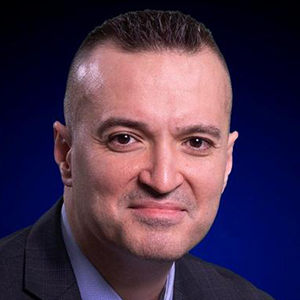Office
NUCL Bldg., Office 132D
Office Phone
765.496.9718
Education
Ph.D., 2004, Nuclear Engineering, North Carolina State University, USA.
M.Sc., 2002, Nuclear Engineering, North Carolina State University, USA.
B.Sc., 2000, Nuclear Engineering, Alexandria University, Egypt.
Prior Appointments
2014-Present, Associate Professor, School of Nuclear Engineering, Purdue University
2013-2014, Associate Professor, Nuclear Engineering Department, NC State University
2007-2013, Assistant Professor, Nuclear Engineering Department, NC State University
2004-2006, Nuclear Engineer, PWR Engineering Unit, AREVA NP, Lynchburg, VA
Research Areas
Validation and Uncertainty Quantification;
Big Data Analytics and Data Assimilation;
Cyberattack-resilient Control Systems;
LWR Computational Reactor Physics;
Key Areas
Big Data Mining
Notable Experience
I have worked in Academia for ten years with strong collaborative ties with national and international government laboratories and industry. I serve as an associate editor for the journal of annals of nuclear energy. I have been invited to give lectures on uncertainty quantification and its challenges and recent advances at many institutions including academic, government, and industry, both nationally and internationally. I consult with a number of governmental institutions including both research and regulatory bodies on safety and validation needs for nuclear power plants operation.
Notable Awards
Mark Mills Award, advisee: Dr. Youngsuk Bang, American Nuclear Society (2013)
Reactor Physics Division Best Paper Award, American Nuclear Society, San Antonio TX, Summer Meeting (2014,2015)
Graduate School Dissertation Award for College of Engineering,
North Carolina State University.
Outstanding Nuclear Engineering Research Award, Department of Nuclear Engineering, North Carolina State University. (2004)
Alan F. Henry/Paul A. Greebler Graduate Scholarship,
American Nuclear Society (awarded twice) (2003,2004)
Notable Affiliations
American Nuclear Society
Sigma Xi Research Honor Fraternity
SIAM Applied Mathematics Society
Associate Editor, Annals of Nuclear Energy
Publications
1. Dongli Huang, Hany Abdel-Khalik, Cristian Rabiti, and Frederick Gleicher, “Dimensionality Reducibility for Multi-Physics Reduced Order Modeling,” Annals of Nuclear Energy, 110, 2017
2. Ryota Katano, Tomohiro Endo , Akio Yamamoto, Mohammad Abdo, and Hany Abdel-Khalik, “Estimation of sensitivity coefficients of core characteristics based on reduced order modeling using sensitivity matrix of assembly characteristics,” Journal of Nuclear Science and Technology, 54, 6, 2017
3. Youngsuk Bang, Hany Abdel-Khalik, Matthew Jessee, and Ugur Mertyurek, “Hybrid Reduced Order Modeling for Assembly Calculations,” Nuclear Engineering and Design, 295, 661-666, 2015
4. Congjian Wang and Hany Abdel-Khalik, “Exact-to-Precision Generalized Perturbation Theory for Neutron Transport Calculations,” Nuclear Engineering and Design, 295, 651-660, 2015.
Biography
Professor Abdel-Khalik has obtained his Bachelor in Nuclear Engineering from Alexandria University in Egypt in 2000. Immediately after graduation he joined the department of Nuclear Engineering at North Carolina State University to pursue his graduate studies. His master and PhD dissertation have produced a number of new algorithms serving as a toolkit to handle the voluminous data streams generated from nuclear plants simulation. His objective was to provide a solid mathematical basis to improve predictions of boiling water core simulators. After graduation he worked as a Nuclear Engineer in the methods group at AREVA-NP in Lynchburg, VA. During his tenure at AREVA, he worked on fuel loading pattern optimization for pressurized water reactors. He returned to North Carolina State in 2007 as a tenure-track assistant professor, and obtained his tenure in 2013. He developed a research program on uncertainty quantification and reduced order modeling during his tenure at North Carolina State. Since his arrival at Purdue in August 2014, he has expanded his research program to design data-driven algorithms to support the validation and safety of nuclear power plants. One aspect of safety that has achieved a great deal of attention in recent years is cybersecurity, for which no clear solution currently exists, especially with the increased level of sophistication that hackers have achieved. He is currently developing a program on employing physics-driven data mining techniques to detect cyberattacks which attempt to manipulate the state of critical infrastructure systems such as nuclear power plants.
